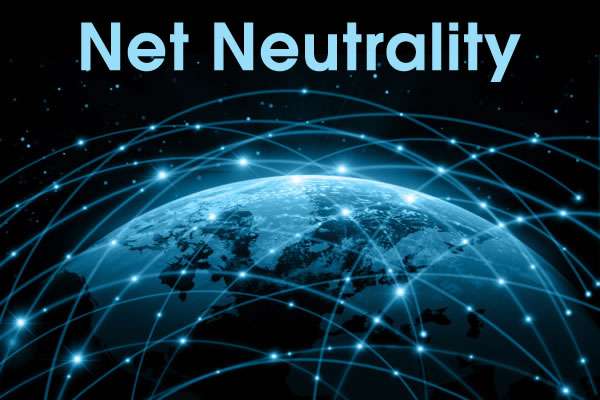Today, hundreds of the Internet’s most notable companies and activist groups are raising awareness about Net Neutrality and the new administration’s plans to remove the protections which were put in place by the previous administration in 2015. The day of action is an attempt to mobilize the users of these large groups to influence legislators and policy-makers to keep existing net neutrality rules in place. Some of the largest companies taking action are Facebook, Google, Amazon, AT&T (yes!), Reddit, Snapchat, Pornhub, Spotify and Vimeo, so the issue should gain awareness from millions of viewers.
I wrote an article last year reviewing the FCC’s stance on net neutrality and the assertion that Tom Wheeler is not, in fact, a dingo. This analogy was drawn by John Oliver on his show Last Week Tonight. In the segment, Oliver compared the hiring of a lobbyist into the position of FCC chair to hiring a dingo to care for your baby. It was a pleasant surprise that Tom Wheeler turned out to be a rational advocate for consumers and net neutrality, and was not, in fact, the “dingo” that many feared he would be. Wheeler modernized the FCC and addressed many of the problems which have affected the Internet under 20 year old regulations which are as old as dial-up!
Fast forward to the new administration and the new appointed FCC Chair Ajit Pai. Pai was Associate General Counsel for Verizon before he moved into government work and has been a consistent advocate of deregulation for telecommunications and broadband in general. He was appointed to the FCC in 2011 by President Obama in a minority Republican position as a result of a recommendation by Mitch McConnell, and was appointed Chairman of the FCC by President Trump in January 2017. After his appointment, he began to immediately focus on an agenda of deregulation.
While Tom Wheeler was Chair of the FCC, the FCC implemented the Open Internet Order in 2015. I had to use the Internet Archive to view the original content about the Open Internet from the FCC, because if you click on the link now, it won’t actually take you to the page describing the Open Internet Order. Instead, in a bizarrely Orwellian fashion, it redirects you to a new page titled “Restoring Internet Freedom” which lobbies to repeal the order which did the most the FCC has ever done to guarantee Internet freedom. The new page outlines Pai’s plan, which advocates rolling back regulations to the Clinton era and using the rules which were enacted 20 years ago when broadband was not ubiquitous, nor a requirement for modern life.
The OIO was the first major modernization of FCC regulations that have become the basis for net neutrality regulations and reclassified broadband providers as “Title II Common Carriers”, which essentially classifies broadband as a utility versus just a paid service. Pai voted against the OIO, and has also voted or argued against policies which would increase regulation on single provider phone services for inmates and other consumer protections, which shows a pro-business, anti-consumer bias.
In an interview on PBS Newshour this past April, Pai claimed that the Title II classification has disincentivized investment and continued to advocate for “light-touch” regulation and cited the success of companies like Facebook and Google as proving that light touch rules are all that we need. His facts were remarkably inaccurate, however, as Capital Expenditures have increased on average by about 5% for publicly traded ISPs, while Pai claimed they declined by 5%, with two-thirds of ISPs by number have increased spending under Title II. Other metrics show even more increases.
These facts are important, because the main complaint of the ISPs and carriers has been that they aren’t a utility and provide optional “information services” to their customers in the same vein as Facebook, Google, and Netflix. This is, for the most part, untrue, barring acquisitions, and even then, the information services are separate businesses. For example, Comcast’s core business as an ISP has not historically included content production as a major distinguishing feature, and the merger with NBC is more of a vertical integration than a joining of similar businesses. In reality, the protective nature of cable companies’ television business has stifled and delayed the current revolution of streaming services by more than a decade at the expense of their consumers. This is very similar to the stance the legacy music business took toward streaming, with a well-known result.
In addition, Pai claimed that there weren’t examples of “market failure”, while in fact there have been multiple examples of anti-competitive behavior, from outright blocking of consumer traffic in the case of VOIP traffic such as Skype, Peer-to-Peer protocols, and other services which competed with broadband provider services, as well as “slowing-down” video and peer-to-peer services such as Netflix, YouTube and the BitTorrent protocol, which competed with legacy cable television services.
ISPs are trying to keep their position as content middlemen, increasing their margins by charging multiple times for the same content, at both the provider and the consumer for bandwidth, and then again for “fast lanes”. Except that they aren’t “fast lanes”- the fast lane is just the rated speed, or the old normal lane. By deprioritizing some traffic, they are implementing slow lanes, double charging the customer and/or the content provider with a second fee in addition to the bandwidth for which they have already paid. Zero Rating, or the practice of ignoring data limits for certain types of content, is identical in practice, where the “rated” traffic is just pushed into a slow lane, because its data is capped, versus the Zero Rated traffic, again regardless of the bandwidth for which the customer has already paid. As cable companies continue to hemorrhage cable subscribers, they will continue lobbying efforts to maintain local monopolies on content, or try to collect a “cut” of streaming content while charging the highest prices in the world for bandwidth due to lack of competition. Pai has acknowledged the lack of competition, but none of the current plans put forward by the FCC address the de facto monopoly most broadband providers have.
To keep a “free and open” Internet, it is important to ensure all traffic is treated the same by the carriers. Both wireless carriers and wired carriers should be regulated to provide plans which advertise and deliver a rated speed, without additional charges for data transfer, type of traffic, and bundling, because, like it or not, broadband, and the Internet, are utilities which provide more value than the legacy phone system and just like Ma Bell, most people only have a single choice of provider. Now that the industry and technology is mature and is a core part of daily life, broadband needs more regulation to enforce competition, and to ensure a free and open Internet.
Last Week tonight has created a redirect for filing a comment on the FCC’s proposal to reverse the protections at http://gofccyourself.com.
This post was written by one of our consulting partners at endra. They are a technology consulting and software development firm with a passion for building and growing cloud native platforms and products. They help companies who are transforming their business and their industry with strategic and results-focused products and services.




